
Copernical Team
For All Mankind: Space drama's alternate history constructs a better vision of NASA
 Great art is often difficult to quantify. Apple TV's series For All Mankind is a case in point, running the risk of being too sci-fi for drama fans (rockets, moon bases, Mars) and having too much naturalistic drama for sci-fi aficionados (jealousy, divorce, institutional politics).
Nonetheless, the show consistently rewards both sets of viewers by brilliantly blurring the line between real
Great art is often difficult to quantify. Apple TV's series For All Mankind is a case in point, running the risk of being too sci-fi for drama fans (rockets, moon bases, Mars) and having too much naturalistic drama for sci-fi aficionados (jealousy, divorce, institutional politics).
Nonetheless, the show consistently rewards both sets of viewers by brilliantly blurring the line between real First release of images demonstrates Euclid space telescope's potential
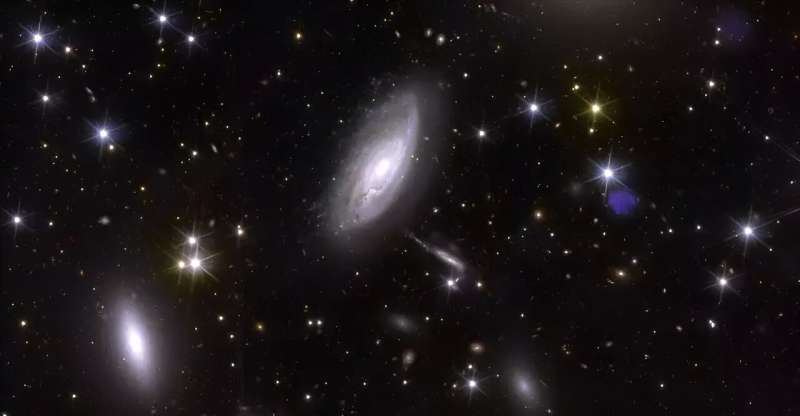
SpaceX Dragon docks with International Space Station carrying new gear
 A SpaceX Dragon spacecraft successfully docked with the International Space Station on Saturday carrying equipment for the station's crew.
The Dragon docked with the ISS's Harmony module at 5:07 a.m., according to NASA.
The Dragon was launched Thursday from Launch Complex 39A at Florida's Kennedy Space Center atop a Falcon 9 rocket.
The spacecraft carried 6,500 pounds of s
A SpaceX Dragon spacecraft successfully docked with the International Space Station on Saturday carrying equipment for the station's crew.
The Dragon docked with the ISS's Harmony module at 5:07 a.m., according to NASA.
The Dragon was launched Thursday from Launch Complex 39A at Florida's Kennedy Space Center atop a Falcon 9 rocket.
The spacecraft carried 6,500 pounds of s SpaceX hopes for second Starship flight test next week
 SpaceX is hoping to re-launch Starship, the most powerful rocket ever built, next week, the company said, after an attempt in April ended in a spectacular explosion.
"Starship preparing to launch as early as November 17, pending final regulatory approval," SpaceX said on X Friday evening.
SpaceX foresees Starship as a next-generation, fully reusable spaceship that will eventually carry b
SpaceX is hoping to re-launch Starship, the most powerful rocket ever built, next week, the company said, after an attempt in April ended in a spectacular explosion.
"Starship preparing to launch as early as November 17, pending final regulatory approval," SpaceX said on X Friday evening.
SpaceX foresees Starship as a next-generation, fully reusable spaceship that will eventually carry b SpaceX Achieves On-Time Launch for Ambitious Transporter-9 Mission
 In a textbook launch, SpaceX's Falcon 9 rocket flawlessly lifted off from Space Launch Complex 4E (SLC-4E) at Vandenberg Space Force Base in California, marking yet another successful step in the company's journey to revolutionize space travel. The launch, which occurred precisely within the planned 55-minute window at 10:49 a.m. PT, marks the ninth dedicated smallsat rideshare mission under the
In a textbook launch, SpaceX's Falcon 9 rocket flawlessly lifted off from Space Launch Complex 4E (SLC-4E) at Vandenberg Space Force Base in California, marking yet another successful step in the company's journey to revolutionize space travel. The launch, which occurred precisely within the planned 55-minute window at 10:49 a.m. PT, marks the ninth dedicated smallsat rideshare mission under the A close-up, on-the-ground view of Europe's next-generation satellites
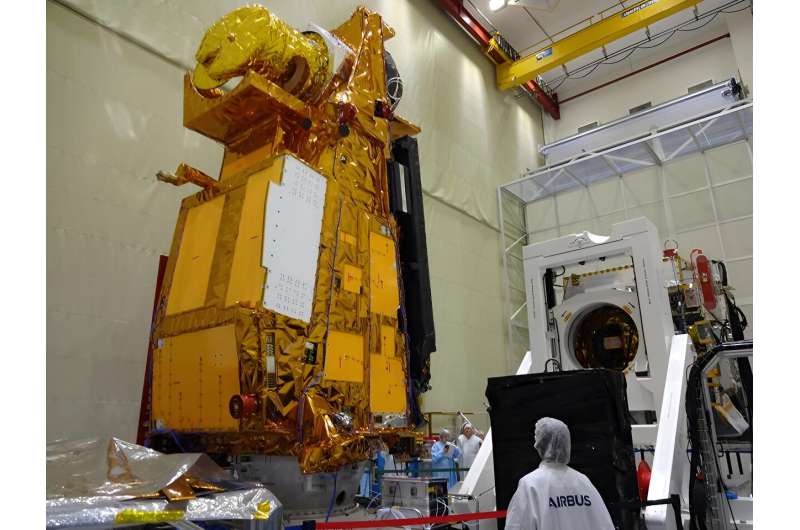
On Nov. 10, journalists were given an up-close view of two very special spacecraft that will soon empower weather services in Europe with more and higher quality data for weather forecasting.
Metop Second Generation A1 and B1 (Metop-SGA1 and Metop-SGB1) are the first pair of a total of six satellites in the EUMETSAT Polar System—Second Generation (EPS-SG) system.
The first two satellites are undergoing testing and integration of their instruments at the Airbus Defense and Space cleanroom in Toulouse, France. It is anticipated they will be launched in 2025–2026 into their low-Earth, polar orbit, at about 835km altitude.
"The multi-billion euro EPS-SG system will be the main source of data for complex computer modeling used for advanced weather forecasting from 12 hours to 10 days ahead," EUMETSAT's EPS-SG Program Manager Fran Martinez Fadrique said.
Hera asteroid mission completes acoustic testing
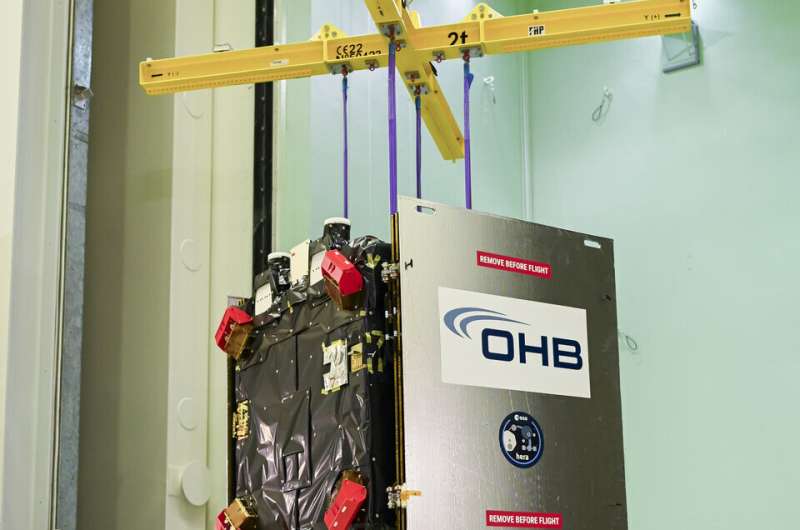
ESA's Hera asteroid mission has completed acoustic testing, confirming the spacecraft can withstand the sound of its own lift-off into orbit. Testing took place within the Agency's Large European Acoustic Facility at the ESTEC Test Center in the Netherlands. This is Europe's largest and most powerful sound system, fitted with a quartet of noise horns that can generate more than 154 decibels of extreme noise.
Diego Escorial Olmos, Hera system engineer comments, "Launch will be the single most stressful day of Hera's life, so we have worked hard to simulate it during our mechanical test phase, first by vibrating the spacecraft on the ESTEC Test Center's shaker tables, and now by blasting it with a noise profile sourced from our launch provider, to be as true to life as possible."
The LEAF chamber stands 11 m wide by 9 m deep and 16.4 m high. One of its walls is embedded with a set of enormous sound horns. Nitrogen shot through the horns can produce a range of noise up to more than 154 decibels, like standing close to multiple jets taking off at once.
Experiments launching aboard SpaceX-29 will help humans go farther and stay longer in space
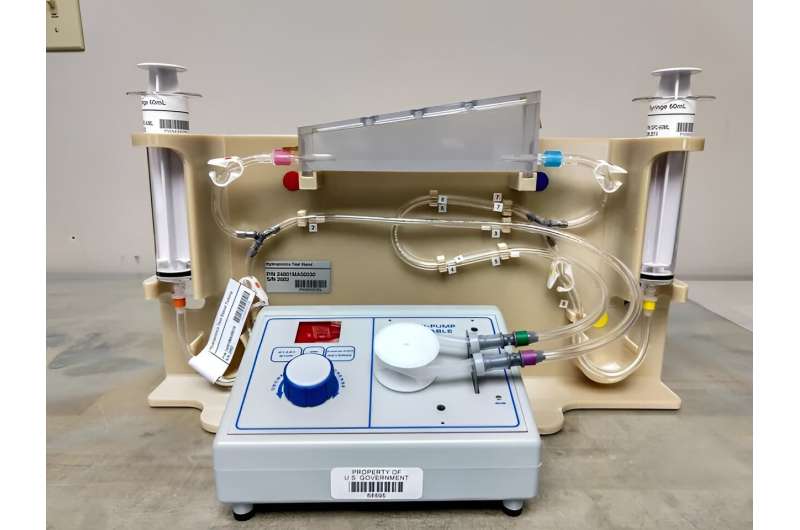
The SpaceX-29 commercial resupply spacecraft will deliver numerous physical sciences and space biology experiments, along with other cargo, to the International Space Station. The research aboard this resupply services mission will help researchers learn how humans, and the plants needed to sustain them, can thrive in deep space.
The biological and physical sciences investigations headed to the Space Station are:
Plant Water Management-5 and 6 (PWM-5 and 6)
NASA has grown plants on the Space Station even without the help of gravity. But microgravity does present challenges and affects Space Station plants' ability to receive adequate hydration and nutrition. The Plant Water Management-5 and 6 (PWM-5 and 6) investigation uses the physical properties of fluids, such as surface tension and wetting, as a mechanism to provide hydration and aeration for plants. Results could advance understanding of the physical aspects of fluid flow and inform designs of fluid delivery systems for reduced gravity environments.
SpaceX shuttles science, holiday treats to astronauts Space Coast launch
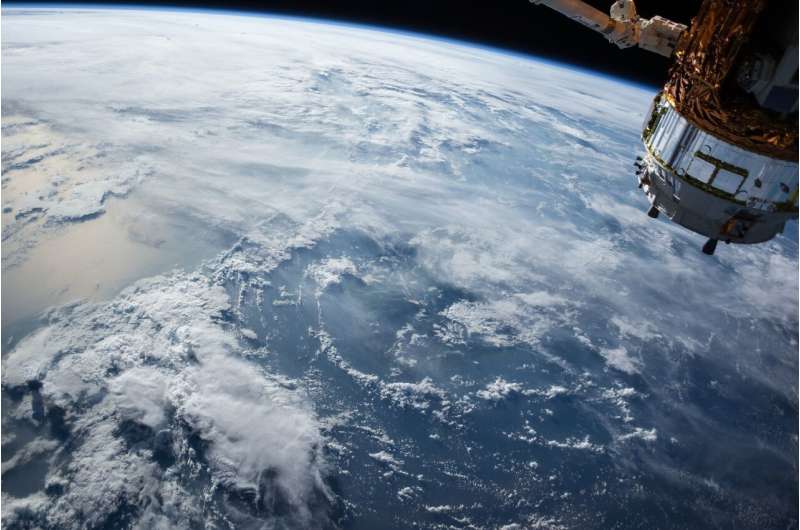
SpaceX launched another rocket from Florida's Space Coast on Thursday night sending thousands of pounds of cargo to the International Space Station while also bringing back a booster that sent a sonic boom across Central Florida.
A Falcon 9 with an uncrewed cargo Dragon on the CRS-29 mission blasted off at 8:28 p.m. Eastern time from Kennedy Space Center's Launch Pad 39-A.
It was the second flight for the rocket's first-stage booster having back in August launched Crew-7, the crew of which are still on the ISS. Its recovery landing came not at seas, but back at Cape Canaveral Space Force Station Landing Zone 1, bringing the signature double sonic boom across parts of the Space Coast and Central Florida.
Orbiting the ISS are seven crew from the U.S., Japan, Denmark and Russia, and they'll get a fresh food kit including oranges, apples, cherry tomatoes and carrots as well as two specialty cheese kits.
"And because we're in the holiday season we've got some fun holiday treats for the crew like chocolate, pumpkin spice cappuccino, rice cakes, turkey, duck, quail, seafood, cranberry sauce and mochi," said Dana Weigel, NASA's deputy program manager for the International Space Station Program on Wednesday during a press conference to discuss the mission's Launch Readiness Review.
Blue Origin's new crane at Port Canaveral: Another piece to future launch puzzle

Blue Origin has staked out its space at Port Canaveral, right next to SpaceX, with a tower crane for eventual rocket booster recovery operations. Now the company just needs to launch one to put it to work.
The crane arrived at the port as cargo from Germany in October adding another puzzle piece to Jeff Bezos' plans to send up its heavy-lift New Glenn rocket from Cape Canaveral Space Force Station's Launch Complex 36.
"It's now the highest point in our Port Canaveral as a whole," said Port Canaveral CEO Capt. John Murray at a port authority meeting last month. "It's a very, very tall crane and when you look across and you see our mobile harbor crane, it looks very small compared to this Blue Origin crane."
At 375 feet tall, it towers over the port's 302-foot-tall crane, both of which are installed at North Cargo Berth 6.
"That's our crane and a significant milestone as we make rapid progress in New Glenn's development," according to an emailed statement from Blue Origin. "The crane will be used to offload New Glenn's fully reusable first stage from our sea-based landing platform back onto shore in Port Canaveral.

